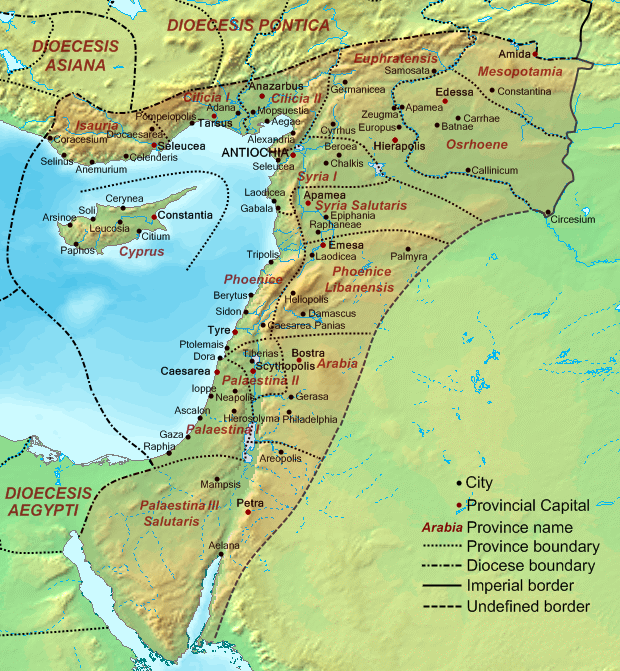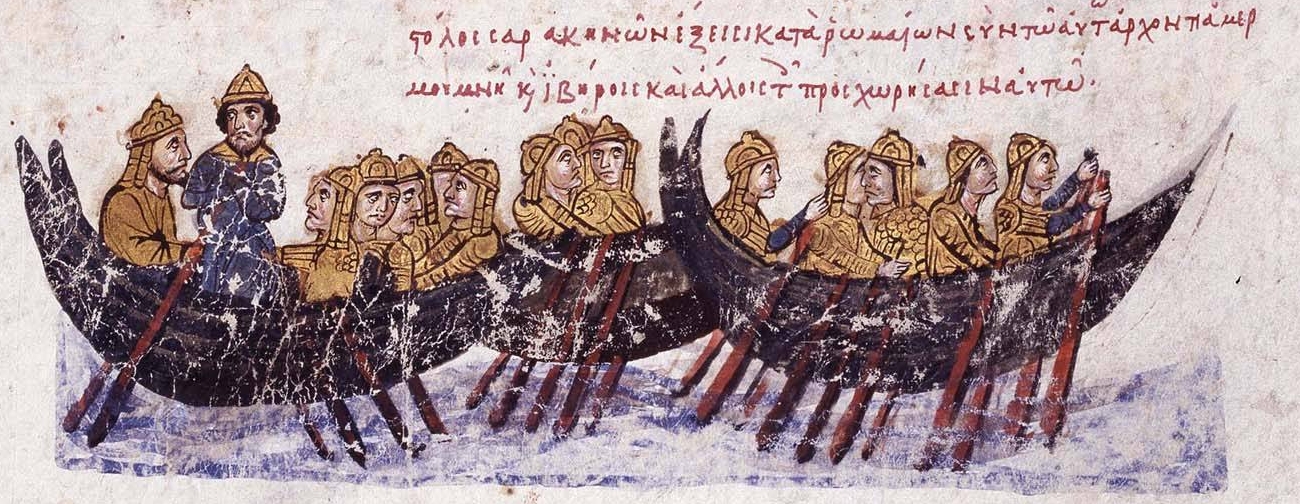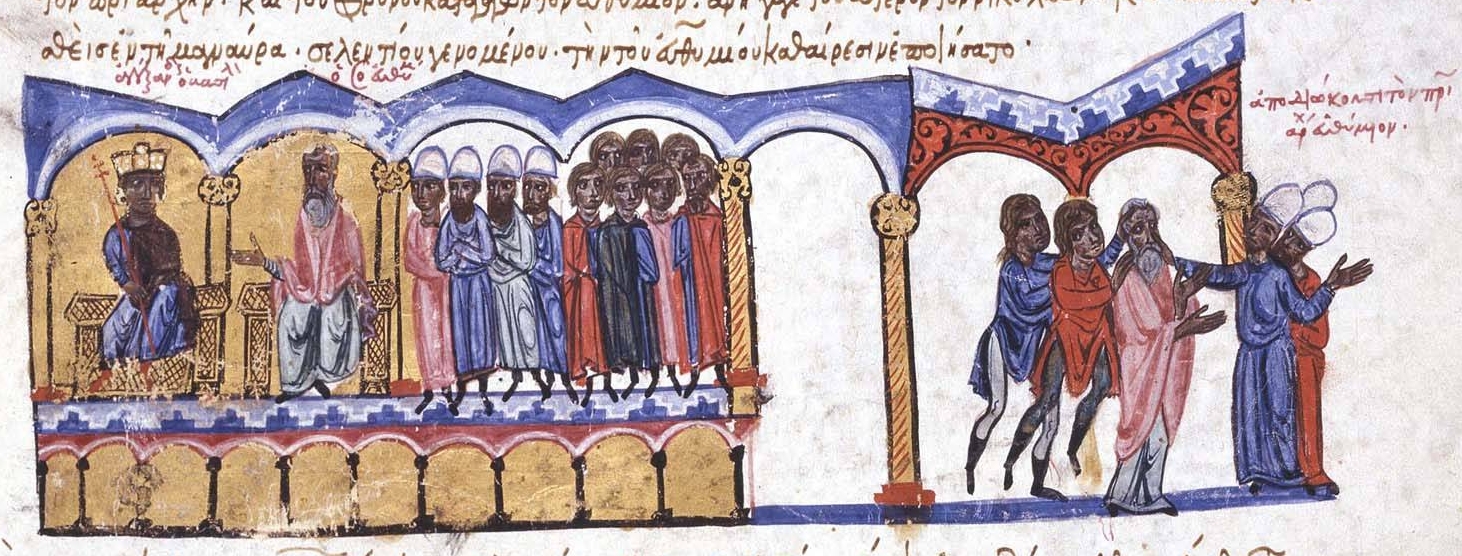|
Eustathios (governor Of The Cibyrrhaeot Theme)
Eustathios ( el, Εὐστάθιος) was the Byzantine governor (''strategos'') of the Cibyrrhaeot Theme in ca. 909–912. Eustathios is only mentioned by the ''De Administrando Imperio'', a work compiled in the middle of the 10th century by Constantine VII Porphyrogennetos. According to it, in approximately 909/910, he was ''protospatharios'', ''asekretis'', and ''ek prosopou'' of the Cibyrrhaeot Theme. Use of the title ''ek prosopou'' ("representative") is ambiguous in the sources, and modern scholars suggest that he was actually the military governor (''strategos'') of the Cibyrrhaeots, rather than the governor's deputy. He came into conflict with the ''katepano'' of the Mardaites, a certain Staurakios Platys. Although both were proteges of the powerful ''logothetes tou dromou'', Himerios, Eustathios clashed with Staurakios over their jurisdiction, as the latter held his appointment directly from the emperor and was wont to disregard the instructions of the theoretically superi ... [...More Info...] [...Related Items...] OR: [Wikipedia] [Google] [Baidu] |
Byzantine
The Byzantine Empire, also referred to as the Eastern Roman Empire or Byzantium, was the continuation of the Roman Empire primarily in its eastern provinces during Late Antiquity and the Middle Ages, when its capital city was Constantinople. It survived the fragmentation and fall of the Western Roman Empire in the 5th century AD and continued to exist for an additional thousand years until the fall of Constantinople to the Ottoman Empire in 1453. During most of its existence, the empire remained the most powerful economic, cultural, and military force in Europe. The terms "Byzantine Empire" and "Eastern Roman Empire" were coined after the end of the realm; its citizens continued to refer to their empire as the Roman Empire, and to themselves as Romans—a term which Greeks continued to use for themselves into Ottoman times. Although the Roman state continued and its traditions were maintained, modern historians prefer to differentiate the Byzantine Empire from Ancient Rome a ... [...More Info...] [...Related Items...] OR: [Wikipedia] [Google] [Baidu] |
Himerios (admiral)
Himerios (Greek: ), also Himerius, was a Byzantine administrator and admiral of the early 10th century, best known as the commander of the Byzantine navy during its struggles with the resurgent Muslim navies in the period 900–912. Biography Nothing is known about Himerios's early life. He was married to the sister of Zoe Karbonopsina, the mistress and later wife of Emperor Leo VI the Wise (r. 886–912), and his career was the direct result of this relationship. Initially a '' protasēkrētis'', Himerios was given command of the Byzantine fleet in 904. A Muslim fleet under Leo of Tripoli was heading towards Constantinople and had already driven back the Byzantines under the ''droungarios tou ploimou'' Eustathios Argyros. Eustathios was replaced by Himerios, who, however, did not have to fight, as the Arabs withdrew on their own. The two fleets encountered each other off Thasos, but the Byzantines chose not to give battle. As a result, the Arabs were able to besiege and sa ... [...More Info...] [...Related Items...] OR: [Wikipedia] [Google] [Baidu] |
Governors Of The Cibyrrhaeot Theme
A governor is an administrative leader and head of a polity or political region, ranking under the head of state and in some cases, such as governors-general, as the head of state's official representative. Depending on the type of political region or polity, a ''governor'' may be either appointed or elected, and the governor's powers can vary significantly, depending on the public laws in place locally. The adjective pertaining to a governor is gubernatorial, from the Latin root ''gubernare''. Ancient empires Pre-Roman empires Though the legal and administrative framework of provinces, each administrated by a governor, was created by the Romans, the term ''governor'' has been a convenient term for historians to describe similar systems in antiquity. Indeed, many regions of the pre-Roman antiquity were ultimately replaced by Roman 'standardized' provincial governments after their conquest by Rome. Plato used the metaphor of turning the Ship of State with a rudder; the Latin ... [...More Info...] [...Related Items...] OR: [Wikipedia] [Google] [Baidu] |
Byzantine Generals
A Byzantine fault (also Byzantine generals problem, interactive consistency, source congruency, error avalanche, Byzantine agreement problem, and Byzantine failure) is a condition of a computer system, particularly distributed computing systems, where components may fail and there is imperfect information on whether a component has failed. The term takes its name from an allegory, the "Byzantine generals problem", developed to describe a situation in which, in order to avoid catastrophic failure of the system, the system's actors must agree on a concerted strategy, but some of these actors are unreliable. In a Byzantine fault, a component such as a server can inconsistently appear both failed and functioning to failure-detection systems, presenting different symptoms to different observers. It is difficult for the other components to declare it failed and shut it out of the network, because they need to first reach a consensus regarding which component has failed in the first pla ... [...More Info...] [...Related Items...] OR: [Wikipedia] [Google] [Baidu] |
10th-century Byzantine People
1 (one, unit, unity) is a number representing a single or the only entity. 1 is also a numerical digit and represents a single unit of counting or measurement. For example, a line segment of ''unit length'' is a line segment of length 1. In conventions of sign where zero is considered neither positive nor negative, 1 is the first and smallest positive integer. It is also sometimes considered the first of the infinite sequence of natural numbers, followed by 2, although by other definitions 1 is the second natural number, following 0. The fundamental mathematical property of 1 is to be a multiplicative identity, meaning that any number multiplied by 1 equals the same number. Most if not all properties of 1 can be deduced from this. In advanced mathematics, a multiplicative identity is often denoted 1, even if it is not a number. 1 is by convention not considered a prime number; this was not universally accepted until the mid-20th century. Additionally, 1 is ... [...More Info...] [...Related Items...] OR: [Wikipedia] [Google] [Baidu] |
Bilad Al-Sham
Bilad al-Sham ( ar, بِلَاد الشَّام, Bilād al-Shām), often referred to as Islamic Syria or simply Syria in English-language sources, was a province of the Rashidun, Umayyad, Abbasid, and Fatimid caliphates. It roughly corresponded with the Byzantine Diocese of the East, conquered by the Muslims in 634–647. Under the Umayyads (661–750) Bilad al-Sham was the metropolitan province of the Caliphate and different localities throughout the province served as the seats of the Umayyad caliphs and princes. Bilad al-Sham was first organized into the four '' ajnad'' (military districts; singular ''jund'') of Filastin (Palestine), al-Urdunn (Jordan), Dimashq (Damascus), and Hims (Homs), between 637 and 640 by Caliph Umar following the Muslim conquest. The ''jund'' of Qinnasrin was created out of the northern part of Hims by caliphs Mu'awiya I () or Yazid I (). The Jazira (Upper Mesopotamia) was made an independent province from the Mesopotamian part of Qinnasrin by ... [...More Info...] [...Related Items...] OR: [Wikipedia] [Google] [Baidu] |
Emirate Of Crete
The Emirate of Crete ( ar, إقريطش, Iqrīṭish or , ''Iqrīṭiya''; gr, Κρήτη, Krētē) was an Islamic state that existed on the Mediterranean island of Crete from the late 820s to the reconquest of the island by the Byzantine Empire in 961. Although the emirate recognized the suzerainty of the Abbasid Caliphate and maintained close ties with Tulunid Egypt, it was ''de facto'' independent. A group of Andalusian exiles led by Abu Hafs Umar al-Iqritishi conquered Crete in either 824 or 827/828, and established an independent Islamic state. The Byzantines launched a campaign that took most of the island back in 842-43 under Theoktistos, but the reconquest was not completed and would soon be reversed. Later attempts by the Byzantine Empire to recover the island failed, and for the approximately 135 years of its existence, the emirate was one of the major foes of Byzantium. Crete commanded the sea lanes of the Eastern Mediterranean and functioned as a forward base and h ... [...More Info...] [...Related Items...] OR: [Wikipedia] [Google] [Baidu] |
Niketas (son Of Ioube)
Niketas ( el, Νικήτας), the son of Ioube, was a Byzantine officer of Arab origin who served as the governor (''strategos'') of the Cibyrrhaeot Theme in ca. 912. Niketas is only mentioned by the ''De Administrando Imperio'', a work compiled in the middle of the 10th century by Constantine VII Porphyrogennetos. According to it, he was the son of Ioube (Ἰούβη, a Hellenized form of Ayyub). Along with his older brother Chase (Hasan) he was a slave of the ''patrikios'' Damian, the ''parakoimomenos'' of Emperor Michael III, implying that they had been captured as prisoners of war during a conflict with the Arabs around the middle of the 9th century or shortly after. It is unclear whether they came alone or with their father; it is possible that they came to Byzantium as children, and that Niketas was even born there. Chase remained a Muslim in Byzantium, but Niketas, whose original Arab name is not recorded, was apparently baptized a Christian. In 912 he was appointed by Emp ... [...More Info...] [...Related Items...] OR: [Wikipedia] [Google] [Baidu] |
Alexander (Byzantine Emperor)
Alexander Porphyrogenitus ( gr, Αλέξανδρος, ''Alexandros'', 23 November 8706 June 913) was briefly Byzantine emperor from 912 to 913, and the third emperor of the Macedonian dynasty. Life Alexander was the third son of Emperor Basil I and Eudokia Ingerina. Unlike his older brother Leo VI the Wise, his paternity was not disputed between Basil I and Michael III because he was born years after the death of Michael. As a child, Alexander was crowned as co-emperor by his father in early 879, following the death of Basil's son Constantine. Upon the death of his brother Leo on 11 May 912, Alexander succeeded as senior emperor alongside Leo's young son Constantine VII. He was the first Byzantine emperor to use the term "''autocrator''" () on coinage to celebrate the ending of his thirty-three years as co-emperor. Alexander promptly dismissed most of Leo's advisers and appointees, including the admiral Himerios, the patriarch Euthymios, and the Empress Zoe Karbonopsina, t ... [...More Info...] [...Related Items...] OR: [Wikipedia] [Google] [Baidu] |
Leo VI The Wise
Leo VI, called the Wise ( gr, Λέων ὁ Σοφός, Léōn ho Sophós, 19 September 866 – 11 May 912), was Byzantine Emperor from 886 to 912. The second ruler of the Macedonian dynasty (although his parentage is unclear), he was very well read, leading to his epithet. During his reign, the renaissance of letters, begun by his predecessor Basil I, continued; but the Empire also saw several military defeats in the Balkans against Bulgaria and against the Arabs in Sicily and the Aegean. His reign also witnessed the formal discontinuation of several ancient Roman institutions, such as the separate office of Roman consul. Early life Born on 19 September 866 to the empress Eudokia Ingerina, Leo was either the illegitimate son of Emperor Michael III or the second son of Michael's successor, Basil I the Macedonian. Eudokia was both Michael III's mistress and Basil's wife. In 867, Michael was assassinated by Basil, who succeeded him as emperor. As the second-eldest son of the Emp ... [...More Info...] [...Related Items...] OR: [Wikipedia] [Google] [Baidu] |
Logothetes Tou Dromou
The ( gr, λογοθέτης τοῦ δρόμου), in English usually rendered as Logothete of the Course/Drome/ or Postal Logothete, was the head of the department of the Public Post ( la, cursus publicus, gr, δημόσιος δρόμος, demosios dromos, or simply , ), and one of the most senior fiscal ministers (logothetes) of the Byzantine Empire. History and functions The office of the is explicitly attested for the first time in circa 762, but traces its origins to the officials supervising the Public Post in Late Antiquity. Until the late 4th century, the administration of the Roman Empire's Public Post was a responsibility of the praetorian prefectures. Due to the abuse of the Post and its privileges by the officials of the praetorian prefecture, in the late 4th century the oversight over the Post passed to the , while the day-to-day administration remained in the hands of the praetorian prefecture. As a result, an official known as the , the inspector of the Publi ... [...More Info...] [...Related Items...] OR: [Wikipedia] [Google] [Baidu] |
Strategos
''Strategos'', plural ''strategoi'', Linguistic Latinisation, Latinized ''strategus'', ( el, στρατηγός, pl. στρατηγοί; Doric Greek: στραταγός, ''stratagos''; meaning "army leader") is used in Greek language, Greek to mean military General officer, general. In the Hellenistic world and the Byzantine Empire, Eastern Roman Empire the term was also used to describe a military governor. In the modern Hellenic Army, it is the highest officer rank. Etymology ''Strategos'' is a compound of two Greek words: ''stratos'' and ''agos''. ''Stratos'' (στρατός) means "army", literally "that which is spread out", coming from the proto-Indo-European root *stere- "to spread". ''Agos'' (ἀγός) means "leader", from ''agein'' (ἄγειν) "to lead", from the proto-Ιndo-Εuropean root *ag- "to drive, draw out or forth, move”. Classical Greece Athens In its most famous attestation, in Classical Athens, the office of ''strategos'' existed already in the ... [...More Info...] [...Related Items...] OR: [Wikipedia] [Google] [Baidu] |






